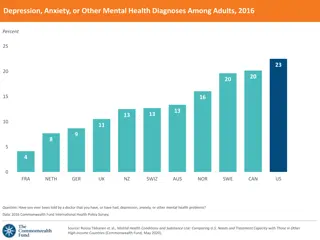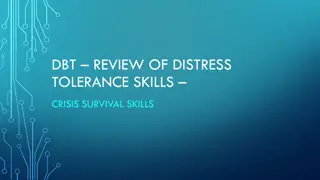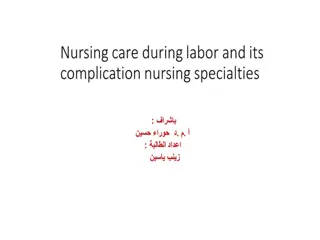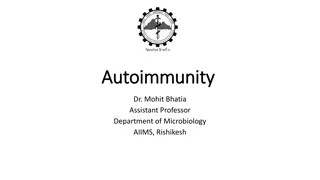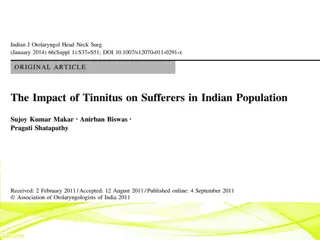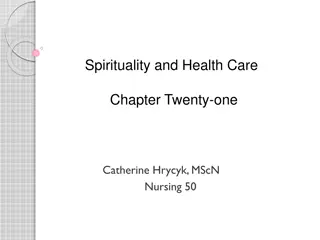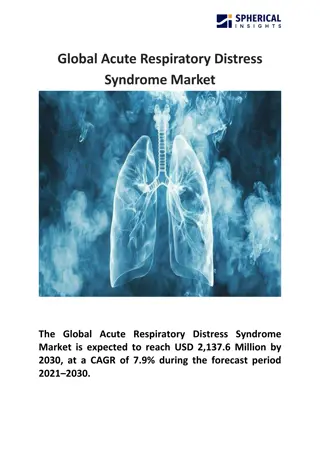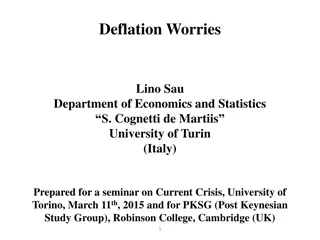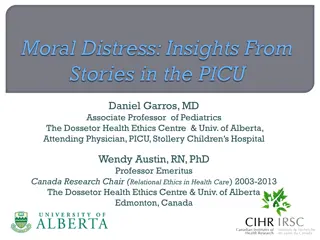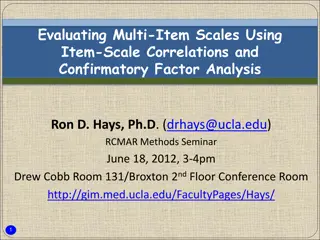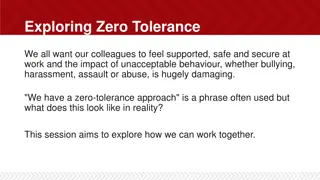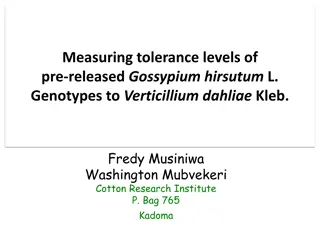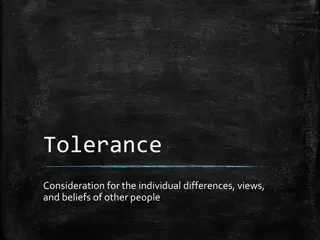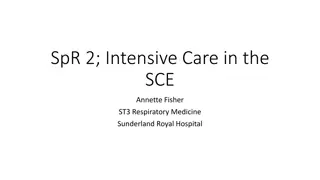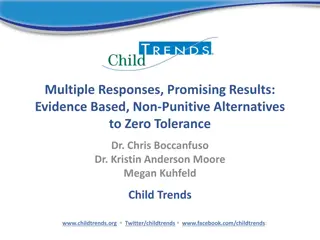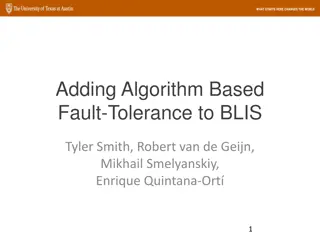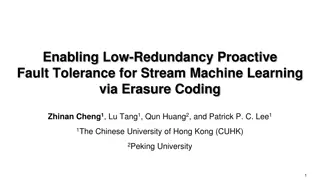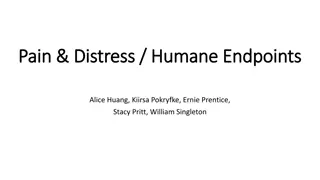Faculty Council Meeting
Document outlines the discussions and concerns addressed during a Faculty Council meeting regarding student support services and responses to student distress in academic institutions. Topics covered include faculty member concerns, responding to students in distress, available resources for student
3 views • 23 slides
Understanding the Relationship Between Mental Health and Diabetes: Insights for Educators
Exploring the link between mental health issues and diabetes, this presentation by Dr. Mary de Groot discusses the implications for diabetes educators. It delves into the prevalence of mental health conditions in people with diabetes, screening, treatment options, and interrelationships between diab
5 views • 45 slides
Agrarian Crisis, Distress, Unrest; Peasant Movements & Suicide
Agrarian crisis in India is deepening, leading to distress among farmers and sparking peasant movements. Factors such as climate dependence, land loss, and lack of government support are exacerbating the situation. Farmer suicides are on the rise due to massive indebtedness. The impacts are far-reac
2 views • 43 slides
Understanding Mental Health and Pandemics
This module delves into mental health terminology, the impact of pandemics on mental well-being, identifying mental distress, tools for prevention and response, and providing support during acute phases of mental health issues. Learners will gain knowledge on various concepts related to mental healt
0 views • 14 slides
Mental Health Insights Among High-Income Countries Adults in 2016
Explore the prevalence of depression, anxiety, emotional distress, and socioeconomic needs among adults in high-income countries based on the 2016 Commonwealth Fund International Health Policy Survey. The data highlights the rates of mental health diagnoses, subjective experiences of emotional distr
1 views • 10 slides
DBT Review of Distress Tolerance Skills & Crisis Survival Techniques
Explore DBT review of distress tolerance skills and crisis survival tactics including STOP method, pros/cons evaluation, crisis urge management, TIP technique and Wise Mind principles. Learn when to apply crisis survival skills and how they can aid in managing short-term crises effectively.
1 views • 15 slides
Exploring TOLERANCE - Artwork by Guy Ferrer
Guy Ferrer, a contemporary French/Mediterranean artist, created the TOLERANCE series to address religious tensions and promote compassion, hope, and mutual respect. Through his sculptures, Ferrer advocates for universal tolerance, emphasizing the importance of accepting different beliefs to foster h
0 views • 16 slides
Understanding Common Labor Complications and Management Options
Labor and birth processes are typically straightforward, but complications can arise, such as failure to progress, fetal distress, excessive bleeding, malposition, prolapsed umbilical cord, cephalopelvic disproportion, and uterine rupture. Management strategies include rupturing membranes, pain reli
1 views • 24 slides
Overview of Life-saving Appliances and Rescue Equipment
Personal life-saving appliances such as lifebuoys, lifejackets, and survival suits play a critical role in maritime safety by keeping individuals afloat and protected in emergency situations. Visual signals like hand flares and buoyant smoke aid in attracting attention during distress. Survival craf
0 views • 12 slides
Privatized Bankruptcy in Shipping: Financial Distress Resolution and Industry Comparisons" (75 characters)
This study explores how financial distress in the shipping industry is managed through private institutional arrangements, minimizing economic costs. It compares unique contractual innovations in shipping to traditional corporate bankruptcy processes, highlighting shipping's outlier status and the e
0 views • 18 slides
Understanding Autoimmunity and Immunological Tolerance
Autoimmunity is a condition where the body's immune cells mistakenly attack its own tissues, leading to damage. Immunological tolerance helps prevent this by mechanisms like central and peripheral tolerance. Central tolerance involves deleting self-reactive immune cells during maturation in key orga
1 views • 32 slides
Understanding the Impact of Tinnitus on Psychological Distress
Tinnitus is a common condition causing subjective and objective sensations of sound without external stimuli. It can lead to physical and psychological distress, affecting emotional well-being and coping abilities. The distress associated with tinnitus includes anxiety, depression, social disturbanc
4 views • 38 slides
Understanding Spirituality and Health Care in Nursing Practice
Exploring the concepts of spirituality, religious versus secular perspectives, spiritual distress, and the role of nurses in providing spiritual support during times of transition and vulnerability. Spirituality is defined as a sense of meaning in life and inner spirit, central to creating beliefs a
0 views • 11 slides
Psychological First Aid: Supporting Individuals Through Crisis
Psychological First Aid (PFA) is a compassionate intervention aimed at stabilizing acute distress and facilitating continued care after a crisis. PFA focuses on meeting basic needs, stabilizing reactions, fostering resilience, and providing emotional support. Key components include comfort, protecti
0 views • 16 slides
Global Acute Respiratory Distress Syndrome Market
The Global Acute Respiratory Distress Syndrome Market is expected to reach USD 2,137.6 Million by 2030, at a CAGR of 7.9% during the forecast period 2021-2030.
2 views • 5 slides
Understanding Basic Hole and Shaft Systems in Manufacturing Processes
Basic Hole and Shaft Systems are essential procedures for determining mating part dimensions and tolerance information in manufacturing drawings. By knowing parameters such as Basic Size, Allowance, Hole Tolerance, and Shaft Tolerance, accurate and functional parts can be produced. This system ensur
0 views • 36 slides
Understanding Deflation Worries in the Eurozone and Fisher's Debt Deflation Theory
Recent concerns about deflation in the eurozone have led to discussions about the potential impacts on the economy. This article explores the Eurostat index data showing a significant drop in inflation levels across several European countries. It also delves into Irving Fisher's Debt Deflation theor
0 views • 34 slides
Understanding Moral Distress in Healthcare
This content discusses the concept of moral distress in healthcare, defined as the pain and anguish experienced when one knows the right thing to do but faces internal or external barriers preventing action. It explores the implications of moral distress on healthcare practitioners and emphasizes th
0 views • 25 slides
Understanding RAID 5 Technology: Fault Tolerance and Degraded Mode
RAID 5 is a popular technology for managing multiple storage devices within a single array, providing fault tolerance through data striping and parity blocks. This article discusses the principles of fault tolerance in RAID 5, the calculation of parity blocks, handling degraded mode in case of disk
0 views • 12 slides
Development and Evaluation of PROMIS GI Distress Scale: Hypothesized Scales and Item Descriptions
This presentation discusses the development and evaluation of the PROMIS GI Distress Scale, consisting of 8 hypothesized scales (Gastroesophageal reflux, Disrupted swallowing, Diarrhea, Bowel incontinence/soilage, Nausea and vomiting, Constipation, Belly pain, Gas/bloat/flatulence) with a total of 1
0 views • 30 slides
Understanding Religious Tolerance in Schools: Insights from Research
Exploring the levels of religious tolerance among students in different types of schools such as Roman Catholic, Evangelical Christian, Muslim, and Non-Faith institutions. The research considers factors influencing students' attitudes towards diversity and highlights varying levels of active toleran
0 views • 15 slides
Psychological First Aid Training Overview for Red Cross and Red Crescent Societies
Psychological First Aid (PFA) Module 2 Basic PFA training schedule includes various sessions such as introduction to PFA, understanding distressing events, reactions to distress, case studies development, role plays, managing complex situations, and practicing self-care. PFA involves comforting indi
0 views • 12 slides
Exploring Zero Tolerance: Creating a Safe and Supportive Workplace
This session aims to delve into the concept of zero tolerance towards unacceptable behaviors such as bullying, harassment, assault, and abuse in the workplace. It discusses prevention, protection, response strategies, and feedback mechanisms to ensure a supportive and secure environment for all empl
0 views • 5 slides
Understanding Pain, Distress, and Humane Endpoints in Animal Research
Explore the concepts of pain, distress, and humane endpoints in animals through a training program aimed at researchers developing protocols for the welfare of laboratory animals. The program includes pre- and post-assessments to gauge knowledge and learning outcomes, covers scenarios illustrating c
0 views • 19 slides
Byzantine Fault Tolerance: Protocols, Forensics, and Research
Explore the realm of Byzantine fault tolerance through protocols like State Machine Replication and HotStuff, discussing safety, liveness, forensic support, and the impact of Byzantine faults. Dive into decades of research on achieving fault tolerance and examining forensic support in the face of By
0 views • 24 slides
Managing Respiratory Distress in End-of-Life Care
Respiratory distress is a common issue in end-of-life care, often causing significant distress to patients and their families. Understanding the causes, utilizing opioids for dyspnea management, implementing non-pharmacological measures, and knowing when to use a distress protocol are crucial in pro
0 views • 26 slides
Advancing Rice Breeding Partnerships in Myanmar: Current Progress and Future Prospects
The collaborative efforts between IRRI and Myanmar in rice breeding have been fruitful since 1965, with numerous rice varieties released in Myanmar having IRRI lineage. The focus is on developing appropriate rice varieties for different regions to ensure rice yield stability. Target traits for delta
1 views • 17 slides
Tolerance Levels of Gossypium hirsutum L. Genotypes to Verticillium dahliae Kleb.
The study aims to measure the tolerance levels of pre-released Gossypium hirsutum L. genotypes to Verticillium dahliae Kleb, a soil-borne fungus causing Verticillium wilt in cotton. The research, conducted at the Cotton Research Institute, focuses on determining tolerance levels of new cotton genoty
0 views • 18 slides
Understanding Organizational Risk Appetite and Tolerance
Explore the development of market risk appetite goals and how to define and establish organizational risk tolerance. Learn about the Classic Simplified View of Risk Tolerance and different methods to determine risk appetite. Discover the importance of assessing market risk impact and aligning risk t
0 views • 8 slides
Exploring Tolerance: Understanding and Practicing Consideration
Tolerance involves considering and respecting the individual differences, views, and beliefs of others, even when they differ from our own. This concept emphasizes the importance of listening, understanding, and appreciating diverse perspectives. Active listening exercises and starter questions help
0 views • 20 slides
Fault-Tolerant MapReduce-MPI for HPC Clusters: Enhancing Fault Tolerance in High-Performance Computing
This research discusses the design and implementation of FT-MRMPI for HPC clusters, focusing on fault tolerance and reliability in MapReduce applications. It addresses challenges, presents the fault tolerance model, and highlights the differences in fault tolerance between MapReduce and MPI. The stu
1 views • 25 slides
Management of Acute Respiratory Distress Syndrome: Case Study and Diagnostics
A 54-year-old woman post-laparotomy presents with respiratory distress and bilateral infiltrates on CXR. The case raises suspicion for Acute Respiratory Distress Syndrome (ARDS). Diagnostic criteria and potential investigations, such as CT pulmonary angiogram, thoracic USS, echocardiogram, bronchosc
0 views • 17 slides
Computing Tolerance Intervals in JMP: An Add-In for Efficient Data Analysis
Tolerance intervals play a crucial role in statistical analysis, especially in industries like pharmaceuticals. This article introduces an add-in in JMP for computing tolerance intervals, highlighting the significance of understanding and interpreting these intervals correctly. The tool aims to simp
0 views • 4 slides
Evidence-Based Alternatives to Zero Tolerance Policies
Zero tolerance policies in schools have not shown clear effectiveness and are associated with negative outcomes for students. Suspensions and expulsions linked to zero tolerance can lead to disconnection from school, risky behavior, poor academic achievement, and entry into the school-to-prison pipe
0 views • 22 slides
Temperature Tolerance of Organisms in the Universe
Life on Earth exists within a range of temperatures, with organisms displaying varied temperature tolerance. Eurythermal organisms can withstand large temperature fluctuations, while stenothermal organisms tolerate only small variations. The temperature range for each species is crucial for their ph
0 views • 8 slides
Understanding the Effects of Air Gap Tolerance on Inductance Tolerance
This technical note delves into the impact of air gap tolerance on inductance tolerance in transformer manufacturing. It explains how controlling the core's air gap dimension is crucial for maintaining desired inductance levels within manufacturing constraints. The text discusses the small scale of
1 views • 10 slides
Ensuring Zero Tolerance Towards Sexual Abuse and Harassment
This module outlines a zero-tolerance policy towards all forms of sexual abuse and harassment within a certain agency, emphasizing the importance of thorough investigation into complaints. It also includes a group activity where participants discuss strategies for communicating the zero-tolerance me
0 views • 5 slides
Enhancing Fault Tolerance in BLIS with Algorithm-Based Techniques
Addressing the challenge of soft errors in supercomputers, this paper introduces algorithm-based fault tolerance methods to enhance the resilience of systems like BLIS. By integrating Application-Based Fault Tolerance (ABFT) into BLIS, the study aims to improve error detection and correction mechani
0 views • 48 slides
Low-Redundancy Proactive Fault Tolerance for Stream Machine Learning
This study focuses on enabling fault tolerance for stream machine learning through erasure coding. Fault tolerance is crucial in distributed environments due to worker failures, and existing approaches like reactive fault tolerance and proactive replication have drawbacks. The use of erasure coding
0 views • 20 slides
Understanding and Minimizing Pain and Distress in Research Protocols
This content explores the importance of reviewing research protocols to minimize pain and distress in animal experiments. It covers defining pain, distress, experimental and humane endpoints, evaluating management strategies, and ensuring ethical practices. It also includes a quick exercise to asses
0 views • 11 slides




